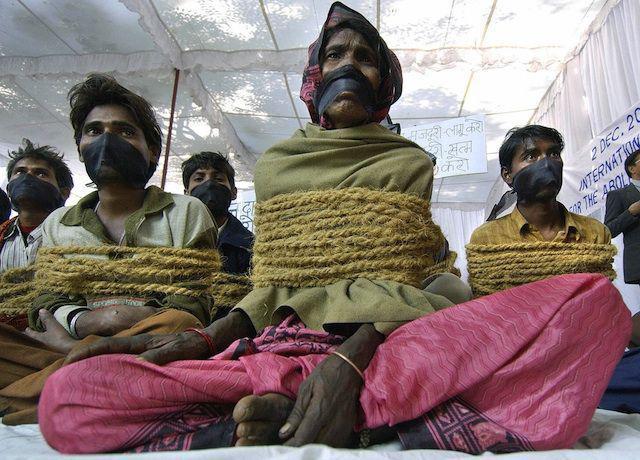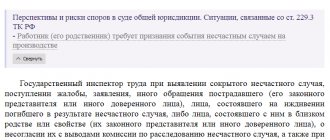What is forced labor
Russian legislation defines the concept of forced labor as work, the requirement to perform which is accompanied by threats or violent influence. At the same time, the legislator identifies two circumstances that are signs of forced labor:
- the first circumstance is the fact that the person did not offer his services voluntarily;
- The second circumstance includes the presence of punishment for refusal to perform work.
In other words, forced labor is work for which the employee did not give his voluntary consent. In practice, coercion to work overtime is most often encountered, including through the confiscation of documents from an employee, etc. But punishment should be understood as deprivation of rights and privileges.
Although the legislator does not give clear instructions in this regard. Therefore, punishment on the part of the employer for refusal to perform work under duress may also include physical force. According to international treaties and labor legislation, a citizen has the right to refuse to perform work if he regards it as forced labor.
The use of forced labor is prohibited by law.
This also includes discrimination in labor relations. All citizens have equal rights to work, therefore only the business qualities of each individual are taken into account. Opportunities, as well as pay, cannot depend on circumstances such as nationality, race, gender, religious beliefs, etc. Such discrimination against an employee is prohibited by law. These standards are contained in ILO Convention No. 111. The employer is responsible for discrimination.
Labor legislation provides for circumstances that cannot be regarded as discrimination, but nevertheless limit the rights of employees. This is permitted primarily to protect citizens. Such circumstances most often include medical examination and professional selection of employees to perform highly specialized work.
What is slavery?
The prohibition of slavery is established at the international level . The first document was the League of Nations convention of September 25, 1926, which proclaimed the abolition of slavery and the slave trade throughout the world.
As of the current 2021, the main document establishing the inadmissibility of slavery is the Universal Declaration of Human Rights (1948), according to which any person who is unable to refuse work of his own free will is recognized as a slave.
As for the legislation of the Russian Federation, Art. Article 37 of the Constitution states that no one has the right to force a person to do work, and any work activity must be respected and fairly paid.
Slavery is a special form of socio-psychological relations between subjects, when one person gains complete control over the actions of another person, thereby exploiting him.
According to the International Labor Organization, slave exploitation exists in 137 countries around the world, and more than 5,000,000 children are victims of exploitation.
Key Concepts
The definition of the term “slavery” is most accurately given in the League of Nations Convention, which was adopted back in 1926. It states here that slavery is the exercise of power over another person inherent in the right of ownership. This provision can be interpreted as follows: a slave is a powerless person who can be disposed of at his own discretion with impunity.
After some time, the definition of “slave” received a more precise formulation. According to the UN declaration, a slave is any person who is unable, of his own free will, to refuse to do any work.
The slave trade is any action aimed at reducing a person to slavery. This includes buying, selling, capturing, recruiting and transporting human goods.
Important! The right to free, paid, safe work without any discrimination is enshrined in Article 37 of the Constitution of the Russian Federation. Any form of forced labor goes against current legislation.
What is meant by slave labor?
This is forced labor that is not paid or for which the owners pay meager amounts of money. Article 37 of the Constitution of the Russian Federation prohibits forced labor.
Everyone has the right to safe, hygienic work and to remuneration for their work without discrimination.
Slave labor and forced labor are essentially identical concepts. But there is a small nuance: slave labor is accompanied by deprivation of personal freedom, the use of various types of violence, including psychological, aimed at establishing such relations between subjects as “master-slave”. Slavery is the most brutal form of forced labor.
Slavery in one form or another exists in the modern world, and this crime must be fought at the legal level.
Types of forced labor
The Labor Code defines the types of labor that are considered forced. And the prohibition of forced labor is the responsibility of the state. These types are:
- work to maintain labor discipline;
- work as a punishment for participating in a strike;
- work as a means of mobilization;
- work as punishment for political or ideological beliefs;
- work as a measure of racial or national discrimination.
In addition, labor legislation distinguishes between certain categories and forms of forced labor. According to this, they are the delay of wages or part thereof and forced performance of work dangerous to life and health without the necessary protection. It is important to know that the legislator does not make this list exhaustive, which means that each case of forced labor is individual.
Features of PR
Forced labor is a field of activity that has distinctive characteristics. The International Convention of 1930 states that forced labor is any work or service that is performed under pain of punishment from another person. In addition, the act states a necessary condition: if a person had the opportunity not to engage in this activity, he would definitely take advantage of it.
The above-mentioned international document also names a number of exceptions, for example regarding military service and military work. This also does not include the work of convicts, civil duties, work under emergency circumstances or during emergencies, as well as service or work under the strict control of representatives of government law enforcement agencies.
The ILO Convention states that forced labor is any economic activity that is aimed at political re-education and also entails discrimination. This type of labor is not allowed as a means of punishing workers for participating in and holding strikes, since this right is established not only by international standards, but also by the Labor Code of the Russian Federation.
What jobs are not considered forced labor?
ILO Convention No. 29 also defines those jobs that cannot be classified as forced labor. In other words, there are cases where circumstances force employers to force employees to perform work that may amount to forced work, but is not. These are the following types of work:
- work that must be performed in connection with military service or military duties;
- work performed during a natural disaster and other emergency circumstances;
- work that is performed under a court order.
The legislator made this list exhaustive, that is, the employer does not have the right to make any changes to it and force employees to work under the pretext of extreme necessity. There are also a number of restrictions that allow workers to be forced to work.
First of all, this concerns the performance of one’s duties during emergencies, martial law, etc. This includes the duration of work, as well as professional, medical and age restrictions. In addition, the Labor Code contains norms indicating the periods during which work with unpaid wages cannot be equated to forced labor.
Work that is established by the court includes correctional work, as well as work that is the responsibility of prisoners in places of deprivation of liberty.
This is the so-called forced labor system. That is, convicted persons are forced to work, which is absolutely legal. At the same time, prisoners should be recruited to work depending on their age, health status, etc.
As for the involvement of convicted citizens in work that is necessary for the improvement of a correctional institution, the legislator directly indicates that they cannot be equated to forced labor. These works contain a system of forced labor, therefore they are regarded as socially useful labor, to which prisoners can be involved.
Commentary on Article 4 of the Labor Code of the Russian Federation
1. The prohibition of forced labor, as well as the prohibition of discrimination in the world of work, is one of the four fundamental principles of international labor law enshrined in the ILO Declaration on Fundamental Principles and Rights at Work (adopted in Geneva on June 18, 1998). ) (see Article 10 of the Labor Code and commentary thereto). The isolation of legislative regulation of this principle in a separate article of the Labor Code should also be regarded as an indicator of its special significance.
In addition to international labor law, the prohibition of forced labor is contained in the norms of international humanitarian law, the sources of which are acts of general and regional validity. The first includes the International Covenant on Civil and Political Rights of 1966, the second - the Convention for the Protection of Human Rights and Fundamental Freedoms of 1950 (ratified by Federal Law of March 30, 1998 N 54-FZ) and the Convention of the Commonwealth of Independent States on the Rights and Fundamental Human Freedoms 1995 (ratified by Russia on November 4, 1995). But the most detailed legal regulation of the prohibition of forced labor is still contained in international labor law, which devoted two ILO Conventions to this problem: No. 29 “On forced or compulsory labor” (concluded in Geneva on June 28, 1930) and No. 105 “On abolition of forced labor" (concluded in Geneva on June 25, 1957). Both Conventions have been ratified by our country. In addition, the prohibition of forced labor is contained in Part 2 of Art. 37 of the Constitution of the Russian Federation and Art. 1 of the Law of the Russian Federation of April 19, 1991 N 1032-1 “On employment in the Russian Federation”.
2. Given in Part 2 of Art. 4 of the Labor Code, the definition of forced labor is based on the wording contained in paragraph 1 of Art. 2 of the ILO Forced or Compulsory Labor Convention, which states that the term “forced or compulsory labor” means all work or service exacted from a person under threat of any penalty, for which that person has not offered himself voluntarily. services. In contrast to what is included in Part 2 of Art. 4 of the Labor Code, this definition speaks not only about forced, but also about compulsory labor. However, this Convention does not give independent meaning to the term “compulsory labor” in comparison with the term “forced labor”, due to which they are indistinguishable. From this point of view, Russian legislation quite legitimately operates with only one term - “forced labor”. At the same time, the characteristics of forced or compulsory labor given by the said Convention and Part 2 of Art. 4 TC have certain differences. This Convention, in addition to performing work under the threat of any punishment (violent influence), also classifies as signs of forced or compulsory labor the absence of a voluntary offer by an employee of his services to perform this work. This circumstance should not be regarded as a violation of the provisions of this Convention by the norms of the Labor Code. It’s just that Russian law has taken a more stringent approach to qualifying specific labor as forced labor, so if, according to the norms of international labor law, this requires the presence of two signs, then according to the norms of the Labor Code, one is sufficient - the threat of applying some kind of punishment (violent influence).
In addition to the general definition of forced labor, Part 2 of Art. 4 of the Labor Code also gives specific examples of it, which practically textually coincide with the list of forms of forced or compulsory labor contained in Art. 1 of the ILO Convention on the Abolition of Forced Labour. In this aspect, the norms of the Labor Code on the prohibition of forced labor are fully consistent with the norms of international labor law.
3. Part 3 of the commented article has no analogues in international labor law and, in fact, expands the list of types of forced labor contained in Art. 1 of the ILO Convention on the Abolition of Forced Labour. In this case, the domestic legislator took a non-trivial approach to the formulation of these two additional types of forced labor. According to Part 3 of Art. 4 of the Labor Code, forced labor is defined as violation of established deadlines for payment of wages or payment not in full. Based on the literal interpretation of this wording, forced labor should include any labor carried out in the absence of payment, not only in full, but also in part. In other words, any delay in payment, partial or complete non-payment of wages must be qualified as forced labor, regardless of the reasons that led to these consequences and the employer’s guilt in their occurrence.
The situation is similar with the second, specified in Part 3 of Art. 4 of the Labor Code, a type of forced labor, which always occurs in the event of a threat to the life and health of an employee due to violation of labor protection requirements in any possible way.
Since forced labor is prohibited, the employer has no right to demand its performance, and the employee has the right to refuse it. Essentially, the employee’s right to stop performing the work assigned to him in such conditions is a way of self-defense of the right to receive paid and safe work (see Article 142 of the Labor Code and the commentary thereto, as well as part 2, paragraph 57 of the Resolution of the Plenum of the Supreme Court of the Russian Federation (hereinafter - Supreme Court of the Russian Federation) dated March 17, 2004 No. 2 “On the application by the courts of the Russian Federation of the Labor Code of the Russian Federation”). The very opportunity to use this method of protecting a violated right arises for the employee from the moment the phenomenon of forced labor appears, i.e. from the first day of failure by the employer to fulfill the obligation arising from the employment contract for proper payment and labor protection (see Articles 142 and 379 of the Labor Code and comments thereto).
4. Part 4 of the commented article of the Labor Code contains a list of types of work that are not recognized as forced labor. In general, it is consistent with a similar list given in Art. 2 of the ILO Convention on Forced or Compulsory Labor. However, the Convention list is formulated more broadly than the list contained in Art. 4 TK. In addition to Art. 4 of the Labor Code it includes: a) any work or service that is part of the ordinary civil duties of citizens of a completely self-governing country; b) small community work, i.e. work performed for the direct benefit of the collective by members of this collective, which therefore can be considered ordinary civil duties of members of the collective, provided that the population itself or its direct representatives have the right to express their opinion regarding the appropriateness of these works.
Despite the fact that our legislator refused to reproduce the wording of these exceptions in the Labor Code, they remain valid in relation to our country. This follows from the fact that Russia has ratified the relevant Convention. It follows that forced labor should not be recognized as those works that are performed for the direct benefit of the collective by members of this collective for the improvement and sanitary and hygienic prevention of buildings and territories occupied by schools, boarding schools, children's and youth health camps, as well as institutions in charge of executing punishments , subject to the provision of representatives of these groups with the right to express their opinion regarding the advisability of carrying out such work.
Responsibility for forced labor
The prohibition of forced labor is regulated by Russian legislation, which is why it also establishes certain liability. What could this responsibility be? First of all, it is important to understand that punishment for forced labor is not provided for as a separate provision of law.
For a short time, regulations contained rules that provided for administrative liability for forced labor. The punishment was in the form of a fine, which was imposed in court. Unfortunately, this regulation has been repealed.
The current Employment Law does not provide for separate liability for forced labor.
However, administrative legislation contains a rule that establishes liability for violation of the labor protection law. It includes administrative liability as well as disqualification. In this case, punishment can only be applied to an official.
As for criminal legislation, it also does not contain provisions directly indicating liability for forced labor. The only thing for which an employer can be held accountable according to the Criminal Code of the Russian Federation is non-payment of wages and other payments, as well as violation of labor safety rules. Labor legislation also contains rules that imply administrative and disciplinary liability for forced labor.
In general, any exploitation of employees may be considered forced labor or discrimination. At the same time, there are cases of forced labor not only for a specific employee, but also for the entire team. Citizens who have been exploited by an employer can go to court or the labor inspectorate for damages.
Author of the article
Responsibility for human trafficking and the use of slave labor
In accordance with international regulations, the Constitution and the Criminal Code of the Russian Federation, trafficking in persons and their use as free labor are crimes for which the perpetrators will suffer proportionate punishment established in accordance with Art. 127.1 and 172.2 of the Criminal Code of the Russian Federation.
Punishment for human trafficking is provided for in Art. 127.1 of the Criminal Code of the Russian Federation . In accordance with this article, slave trade, including the purchase and sale, recruitment, transportation, harboring, transfer or receipt of a person for the purpose of free and selfish use of his labor, is punishable by imprisonment for a term of up to 5 years.
The same crime committed by a person:
- in relation to a group of persons or a minor;
- using official position;
- with transportation of the victim across the border of the Russian Federation;
- with the seizure, retention or destruction of the victim’s identity documents;
- using violence or blackmail;
- for the purpose of removing organs or tissues from a person,
is punishable by the Criminal Code of the Russian Federation with imprisonment for a term of 3 to 10 years.
If human trafficking was committed by an organized group and resulted in death or other grave consequences, then the perpetrator faces imprisonment for a term of 8 to 15 years.
A person who for the first time committed an act provided for in Part 1 or Clause “a” of Part 2 of this article, who voluntarily freed an exploited person and contributed to the discovery of the crime, is exempt from punishment.
Under human exploitation in Art. 127.1 refers to any state of servitude, as well as any forms of sexual exploitation and slave labor (Federal Law No. 73 of July 21, 2004).
Forcing slave labor is also a criminal offense, for which there are 2 types of punishment: forced labor for 5 years and imprisonment for the same period.
Part 2 of Article 127.2 of the Criminal Code of the Russian Federation outlines the responsibility of persons who have committed a crime against several citizens or a minor, as well as for the use of threats and violence against an exploited person, his transportation outside the Russian Federation, the seizure and retention of documents of the victim, etc. .
Punishment options under Part 2 of Article 127.2 of the Criminal Code of the Russian Federation:
- forced labor for up to 5 years;
- restriction of the right to engage in certain types of work;
- removal from office for up to 15 years.
If it is established that the act resulted in serious harm to health or death of the victim, the punishment will be much more severe:
- restriction of freedom for 1 year;
- imprisonment for a term of 8 to 15 years.
What are the dangers of forced labor?
Article 4 of the Labor Code of the Russian Federation contains a direct ban on forced labor. For violation of this norm, various penalties are applied.
The Administrative Code considers this as a violation of labor legislation under Art. 5.27 and 5.27.1. The amount of the fine that is collected in this case is up to 5 thousand rubles for officials and individual entrepreneurs, up to 50 thousand rubles for organizations.
The Criminal Code provides for liability for the use of slave labor, which is punishable by forced labor for up to 5 years. If a crime was committed against minors or several persons, violence was used or documents were confiscated, then imprisonment for a term of up to 10 years is possible. In case of harm to the life or health of citizens through the use of slave labor or the occurrence of other grave consequences, the perpetrators face imprisonment for a term of up to 15 years.
Thus, forced labor in any form on the territory of the Russian Federation is prohibited by law.
Punishment

Under Article 127.2, the following punitive measures may be applied to the accused:
- coercion to perform any work, manifestation of property rights in relation to the victim - up to 5 years of imprisonment or assignment of forced labor for a similar period;
- criminal acts involving the use of official powers, destruction/concealment of the victim’s personal documents, the use of violence or the threat of violence against a minor, two or more persons - 3-10 years in prison, a ban on engaging in these types of activities for up to 15 years;
- committed by an organized group, causing serious harm to health or death of the victim due to negligence - 8-15 years in prison.
What actions are inextricably linked with PR?
Forced labor is the commission of certain actions that fall under the above qualifications. So, this type of illegal activity includes the following actions:
- Kidnapping a person and using physical violence against him.
- Acceptance of debt bondage by birth or inheritance.
- Illegal activity of buying and selling a person, as well as making other transactions in relation to a person.
- Limitation of physical space, for example within private property. This may also include illegal detention in custody, in places of deprivation of liberty, or at work.
- Psychological coercion, which is accompanied by threats not only of punishment for disobedience of the person himself, but also of reprisals against relatives and other close persons.
- Providing deliberately false information about working conditions, wages, place of work, etc.
- Retention of a citizen’s personal documents, including identification documents, such as a passport, driver’s license, as well as other list of securities.
- Sexual violence.
- Exclusion from public life, from the community, as a result of which a person is assigned certain responsibilities to perform one or another type of work.
- Deprivation of food, shelter, and money due to failure to follow work instructions.




